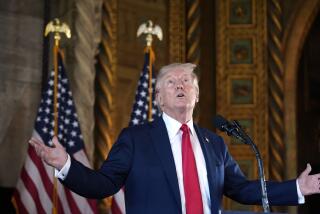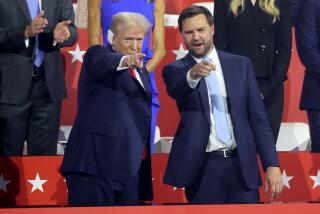The Odd Flight of Jerry Brown
- Share via
And so for Jerry Brown it has ended as it began, ranting and raving like some crazy man, struggling for a spot on the stage while the political pros ridicule him. Go away, they clucked at Brown. Cut a deal, they scolded. Shut up. Behave.
That Brown did not behave last week in New York was offered as proof of his immaturity. He was the party pooper, crashing Gov. Bill Clinton’s big media fiesta. Of course, had Brown taken the opposite course and played ball with the insiders, this would have been presented as evidence of his insincerity--the insurgent sells out.
So Brown couldn’t win at the Democratic National Convention, but at least he made it there, riding his crude little 800-candidacy a lot further than anyone ever expected. Remember the first debate? Flashing his 800-number and newfound populist fury, he came across more like a Cal Worthington with rabies than a former California governor. It was embarrassing. Brown, the pundits said, was unfit to compete with the likes of Bob Kerrey and Tom Harkin.
Well, Brown hung in there, delivering a simple message. Politics, he argued, had degenerated into an insiders’ game, lubricated by special interest money, irrelevant to most Americans. He would be the anti-politics politician, refusing contributions larger than $100, reaching out to those who, in disgust and anger, no longer bother to vote. Wonderful message, wrong messenger, snickered his foes, and maybe they were right. Still, isn’t it curious how no other candidate adopted this wonderful message? Apparently, campaign finance reform is wonderful only in non-election years.
A remarkable achievement of Brown’s anti-money campaign was how much money it raised. He collected more than $6 million, at times outpacing Clinton. Next time around, I suspect, they’ll need a special telephone book to list all the 800-VOTE4ME numbers.
Also, through his most unconventional campaign ever, Brown managed pretty much to shed his old Moonbeam image. His quest somehow resonated with people who once dismissed him as a flake. It took guts to get up every morning, pull on that turtleneck and face the ridicule of third-string radio personalities. Even Mike Royko, the Chicago columnist who tagged him Gov. Moonbeam, was moved to declare the label “null, void and deceased.”
Brown had a few big moments, winning Colorado, Maine and Connecticut. The Connecticut victory might have been his undoing. New York followed, presenting Brown with a golden opportunity to, as one adviser put it, “cast a long shadow,” to ditch the Cal Worthington stuff and start acting presidential. Instead, all he could offer was Jesse Jackson and more of his shrill, listen-to-me rhetoric, and he crashed and burned.
His failure exposed a key riddle in this new science of outsider politics. It is one thing to ride the protest rocket, to become in essence the “no” vote against politics as usual. That gets you off the launch pad. So far, though, no one has figured out the next stage: how to shift in mid-flight from protest vehicle to electable candidate, someone people will vote for on merit, a “yes” vote. Brown couldn’t do it, and neither could Ross Perot.
Brown talks now of building a movement, but I have doubts. For one thing, building is not his strength. He’s more astronaut than rocket scientist, and while he rode this campaign as well as anyone could, by design it does not easily afford a second chance. Brown is no dummy. He went in knowing that not only was he likely to lose, he also risked political alienation.
So why did he do it? People say he loves the limelight, or is arrogant, or is driven by a Messiah complex--analyses that could be applied to almost any politician. His conversion from two-time governor to political outsider was difficult to swallow. Well, we believe what we want to believe. Weary of voting for the lesser of evils, I prefer to believe that Brown ran for his stated reason--to knock down the wall that separates politics from reality.
I go back to a letter he wrote last September to his supporters: “Not for a moment, do I believe that I am the only person--or even the best person--to undertake this effort. However, by experience, conviction and circumstance, I am in a position to help open the political door through which many others might walk.”
So he went out and gave voice to an anger felt by many Americans. Yes, the door got slammed shut in his face, but a crack was left open. His campaign showed there’s something on the other side of politics as usual, and suggested one way to get there. We’ll hear a lot about change now from Clinton and President Bush and other candidates down the line. Someday one of them might actually deliver. That there is that hope, however faint, is Brown’s principal achievement.
More to Read
Get the L.A. Times Politics newsletter
Deeply reported insights into legislation, politics and policy from Sacramento, Washington and beyond. In your inbox twice per week.
You may occasionally receive promotional content from the Los Angeles Times.










